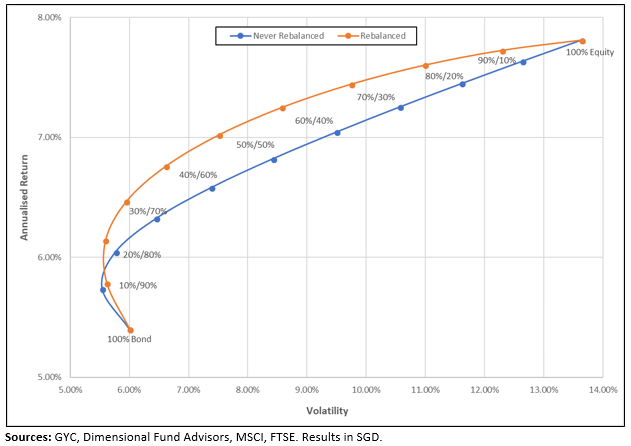Why you need to keep calm in turbulent markets
22 November 2018

Have you seen the financial news lately? How did you feel when reading headlines like: “Half the stocks are in a bear market“, “Nasdaq could plunge more than 15 percent“, “The end of the long running bull market“, or “China-US spat is fuelling the sell-off“?
Are you anxious, scared, panicked? These are all normal emotions to feel when markets are volatile and talking heads on the news are forecasting the end of the world as you know it. Your amygdala sparks off your flight or fight response, you break into a cold sweat, and visions of thousands of dollars going down the drain start playing on repeat in your head. You feel the need to sell everything, or at least do something.
But, guess what? Acting on these emotions can do you more harm than good.
The truth is that no one can reliably predict what will happen next in the markets. As we have written before, supposed market experts, economists, market analysts and so on have a terrible record when it comes to predicting the future of stock markets; although they certainly do a good job of scaring people!
What about the portfolios you have with us? In case you have forgotten, here is a recap of some of the ways we help to protect your investments:
1. Rebalancing
Investors sometimes feel a strong urge to react to volatility, be it by selling everything to cash, adjusting their asset allocation on the fly, or maybe even hiding in the supposed safety of gold or the US dollar.
Nobel laureate William Sharpe has shown in his research that such actions do investors no good. We definitely don’t do that for you. Instead, we rely on a more systematic process that allows us to buy low and sell high on your behalf – a process called rebalancing.
Whenever the asset allocation in your portfolio shifts due to market turbulence, we sell the assets that have risen in price to buy those which have lost. This process doesn’t involve any emotional decisions, and incrementally adds to your returns while lowering risk (indicated by volatility), as the diagram below shows.

2. The Power of Diversification
When equity markets turn rocky, other markets (like high-grade government bonds) do well. Even within the equity markets, there are varying degrees of return (or losses) – from the relatively stable (globally-diversified equities) to the highly-volatile (emerging market equities).
If you are overexposed to a particular sector or asset, you are likely to experience greater volatility or larger swings in your portfolio, especially when markets take a dive. Being properly diversified across the world, and adding varying amounts of high-quality bonds to your portfolio will limit the damage that might occur. That is how diversification spreads your risk and smooths out the bumps in your investments.
The diagram below shows the different rates of return for this year for various asset classes (till end Oct 2018). It is no surprise that Asian equities and emerging market equities have taken the biggest tumble, having the highest volatility and following right after a stellar 2017.

3. Risk First Approach
We use Asset Class Investing, which is a broadly-diversified approach that focuses on particular dimensions of return. This allows us to run systematic risk and loss analyses on all our portfolios, including worst-case-scenario analyses during left-tail events. This ensures that we keep within the stated quantifiable risk of the portfolio, and is particularly important when markets tumble or are volatile, as it helps to limit losses.
Even if market conditions continue to deteriorate, systematic rebalancing (and, in extreme cases, activating appropriate risk reduction measures when triggered by our proprietary Risk Matrix system) will help your portfolio ride out the bumps.
There is no doubt that market volatility can be worrisome, and generate acute feelings of distress. However, accepting how markets work and safeguarding your investments with our portfolio risk management measures, makes the ride through this volatile market environment much more bearable.
If you are worried, discussing your concerns and reviewing your long-term goals with your adviser will help you stay the course.
Keep calm!
#
If you have found this article useful and would like to schedule a complimentary session with one of our advisers, you can click the button below or email us at customercare@gyc.com.sg.
IMPORTANT NOTES: All rights reserved. The above article or post is strictly for information purposes and should not be construed as an offer or solicitation to deal in any product offered by GYC Financial Advisory. The above information or any portion thereof should not be reproduced, published, or used in any manner without the prior written consent of GYC. You may forward or share the link to the article or post to other persons using the share buttons above. Any projections, simulations or other forward-looking statements regarding future events or performance of the financial markets are not necessarily indicative of, and may differ from, actual events or results. Neither is past performance necessarily indicative of future performance. All forms of trading and investments carry risks, including losing your investment capital. You may wish to seek advice from a financial adviser before making a commitment to invest in any investment product. In the event you choose not to seek advice from a financial adviser, you should consider whether the investment product is suitable for you. Accordingly, neither GYC nor any of our directors, employees or Representatives can accept any liability whatsoever for any loss, whether direct or indirect, or consequential loss, that may arise from the use of information or opinions provided.









